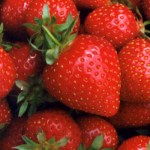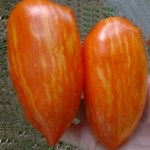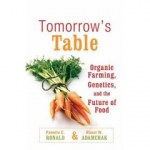organic farming
The ‘Frankenfoods’ debate is coming to your dinner table. Just last month, a mini-war developed in Europe, when the European Union’s chief scientist, renowned biologist Anne Glover, said that foods made through genetic engineering, such as soy beans—about 80 percent of US grown soybeans have been genetically engineered —are as safe as organic or conventional foods.
It’s a wholly uncontroversial comment—at least among scientists. But it set off the usual scare mongering from Friends of the Earth, and other like-minded advocacy groups that finds all genetically engineered (GE) foods and…
A paper in this week's issue of Nature and a commentary on Revkin's DotEarth blog reinforces the argument that a hybrid path in agriculture -- incorporating both conventional and organic production practices -- gives the best chance of feeding some 9 billion people by midcentury in an ecologically-based manner.
The thoughtful and comprehensive study compares yields in organic and conventional systems and addresses the criticisms of an earlier study by Badgley et al (for problems with the earlier study, see the supplementary discussion in Seufert et al).
The organic agriculture movement has…
The New Earth Archive is a resource network of powerful, inspiring books on climate change, sustainability, social justice, and human nature.The students ask you to vote for up to 15 of your favorite books.
So pleased, Tomorrow's Table made the list!
http://www.surveygizmo.com/s3/808430/neweartharchive-ballot
Whoie Earth Discipline, by Stewart Brand is also on the list and so are many other great books.
Please spread the word. Thanks for your support.
The New Earth Archive was developed by students at the New Jersey Institute of Technology, and supported by Paul Hawken and other leading…
The New Earth Archive is a resource network of powerful, inspiring books on climate change, sustainability, social justice, and human nature.The students ask you to vote for up to 15 of your favorite books.
So pleased, Tomorrow's Table made the list!
http://www.surveygizmo.com/s3/808430/neweartharchive-ballot
Whoie Earth Discipline, by Stewart Brand is also on the list and so are many other great books.
Please spread the word. Thanks for your support.
The New Earth Archive was developed by students at the New Jersey Institute of Technology, and supported by Paul Hawken and other leading…
Applause for Plant Physiologist Helen Stafford who left the Reed College Biology Department $1M. As a woman scientist in the 1950s, Stafford was ineligible for many jobs. Reed College, not deterred by her sex, offered her a position. She went on to establish a successful career and inspired many young scientists. Here is a short story of how she influenced my career.
The windowless room, dank an dark, was not an obvious place for inspiration. I took notes, wondering if I would be able to glean anything meaningful from Professor Helen Stafford's (1922-2011) meandering lecture. I was skeptical…
Strawberries are a particularly pest prone crop.
To control these pests, more than 9.5 million pounds of pesticides, including over 3 million pounds of methyl bromide, a toxic ozone-depleting chemical is applied each year. Methyl bromide is also associated with an increased risk of prostate cancer in farm workers.
We all like strawberries, but this pesticide use seems excessive: more pounds of pesticides were applied to 28,000 acres of strawberries than to 780,000 acres of cotton (and cotton is one of the world's most pesticide intensive crops).
To avoid contributing to the use of methyl…
Generalizing about "GMOs" is almost completely useless. Each food we eat and each farm is so different that the genetic technologies and farming practices needed to optimize sustainability must be different too. That is why each crop (GE or conventional) must be looked at on a case-by-case basis, using science-based evidence.
I recently wrote a short Scientific American guest blog post for their "Passions of Food" day examining how cotton genetically engineered to express the organic protein Bt is affecting agriculture today. Thanks to Bora Zivkovic, former ScienceBlogger, for this…
This week, the G20 Agriculture Ministers gathered for their first-ever meeting to discuss potential measures to address price volatility and record high food prices. The key to any long-term solution is acknowledging that we need to empower the very people whose lives are most affected by food shortages. Three-quarters of the world's poorest people get their food and income by farming small plots of land. The potential of small farmers for getting us out of this and future food crises cannot be overstated.
Today, we find that millions of lives depend upon the extent to which agricultural…
The journalist Marc Gunther recently posted a thoughtful article discussing public perceptions of the role of organic agriculture in a future sustainable food system.
He found that many consumers believe that there are only two ways to produce food:
"The first can be described, depending upon who's talking, as big, fast, modern, conventional, industrial, intensive, chemical, genetically-modified, processed and global. It's the system that delivers most of the food that most Americans eat."
"The second is described as organic, sustainable, local, small-scale, family-owned, natural, agro-…
Recipe of the week: Turnip Blue Cheese Gratin
Raoul has lots of turnips and rutabagas at the farm.
This recipe was provided by our friends Sue and Buck at a recent bring-your-best-dish-ever potluck. It was delicious. The chef used rutabagas instead of turnips, but feel free to use either or mix and match.
Ingredients
2 cloves garlic, smashed
salt and pepper to taste
3/4 cup half-and-half cream
5 sprigs fresh thyme
1 bay leaf
2 large leeks - cleaned, and cut into 1/4 inch thick rounds
2 large turnips (or rutabagas), peeled and sliced
1 cup cubed butternut squash (optional)
4 large mushrooms…
Happy New Year!
Here is a post from Raoul at the Student Farm at UC Davis.
From the vegetable's point of view the holidays weren't that great. Continuous rain or fog was only broken up by hard frosts. Our head rot resistant broccoli varieties proved to be not as resistant as advertised, hence there is no broccoli in the Student Harvest baskets today. The good news is that greens and root vegetables are doing fine.
Today's baskets include: rutabagas, fennel, collards, delicata squash, cilantro, radicchio, Purple Haze carrots, Komatsuna, Dino kale, Chinese cabbage, beets, carinata kale,…
One more day to vote in the , which asks the question "Is Biotechnology compatible with sustainable agriculture?"
PZ Myers answers the question this way: "this is weird: agriculture is biotechnology, and just breaking ground with a sharp stick and throwing some seeds in is an example of an 'unnatural' human practice"
He also publishes the opposition's "top secret email", which has some gobbledy-gook about how farmers are turning against GE crops (um, name one?) and contaminating nature (massive reductions in insecticide use on BT cotton fields and enhanced biodiversity is destruction?). PZ…
The Economist is running an online debate and we need your vote.
Vote here.
My opening statement:
The number of people on Earth is expected to increase from the current 6.7 billion to 9 billion by 2050 with food demands expected to rise by 70%. How will we feed them? If we continue with current farming practices, vast amounts of wilderness will be lost, millions of birds and billions of insects will die, scarce water will be wasted, greenhouse gas emissions will increase and farm workers will be exposed to harmful chemicals. Clearly, the future of our planet requires that we improve the…
The most devastating impact on biodiversity is caused by agriculture. Farming is already the greatest extinction threat to birds, and its adverse impacts look set to increase, especially in developing countries (Green et al. 2005).
Thus one of the global challenges for the next century is the need to develop high-yielding varieties that require minimal inputs, so that impacts on biodiversity can be minimized.
An alternative to the "high-input" approach is to expand the number of organic
farms. Because organic farmers do not use synthetic pesticides, their farms support
higher levels of…
Today is the first week of Fall quarter at UC Davis and the Student Farm has harvested some glorious vegetables.
The tomatoes in the CSA (community supported agriculture) basket today came mostly from the farm's Seeds of Change variety trial. The green striped, red striped, orange, dark striped, etc. tomatoes represent only a fraction of the 75 varieties the farm trialed
this year. There are a couple of red slicers in the mix as well. In their newsletter, the Student Farm crew (Eric, Larisa, Sasha, Ari, Ethan and Raoul) asks us customers to observe how the trial tomato varieties compare to…
Bill Gates had a lot of thoughtful things to say about technology and social innovation at the recent Techonomy conference, including a nice plug for Tomorrow's Table!
"There's a lot of great thinking [from both the GMO and organic communities], which lead to things you should care about-preserving the environments and feeding people with a decent diet."
Video:
Reinventing Capitalism: How to jumpstart what the marketplace can't
Speaker: Bill Gates, Bill & Melinda Gates Foundation Interviewed by Brent Schlender
http://link.brightcove.com/services/player/bcpid87735931001?bclid=87675…
The…
Korea has a 5000 year history of food and farming. How much can a nine-year old and her mother learn on a two week visit to this land of miracles?
For the first few nights we stayed in a tiny room in a traditional Korean house called a "Hanok" house. There is a courtyard that everyone shares that the owners have filled with lots of stuff including a rabbit named Mimi. In this quiet place, one can imagine ancient times before the rebirth of this powerful nation that was almost totally destroyed by the Korean war (1950-1953). Now, although most cities are dominated by massive buildings and…
Some thoughtful and interesting letters in response to the OpEd that James McWilliams and I wrote recently for the NY Times. Here are some highlights:
I think that there are many in the organic food movement who recognize that genetic engineering has a role to play in the future of food. But concerns about what it should be, and who should be making that decision, are valid. I am all for nonprofit groups and university researchers working to alleviate starvation in the third world. I trust their motivations and scientific integrity. I have no such faith in agribusiness.
Traditional small…
The World Science Festival, is a five day-long extravaganza of science in New York City that is coming up this year on June 2-6. The World Science Festival (now in it's third year) is not only for adults interested in science society- it is for kids, too. That why I will bring my 9 year old daughter with me. She is clamouring for high heels to wear to the opening night gala honoring Stephen Hawking. On Sunday, the heels will come off for some fun at the Festival Street Fair, featuring Discovery Theater and Author's Alley.
On Friday evening, I will participate in a panel called Food 2.0:…






